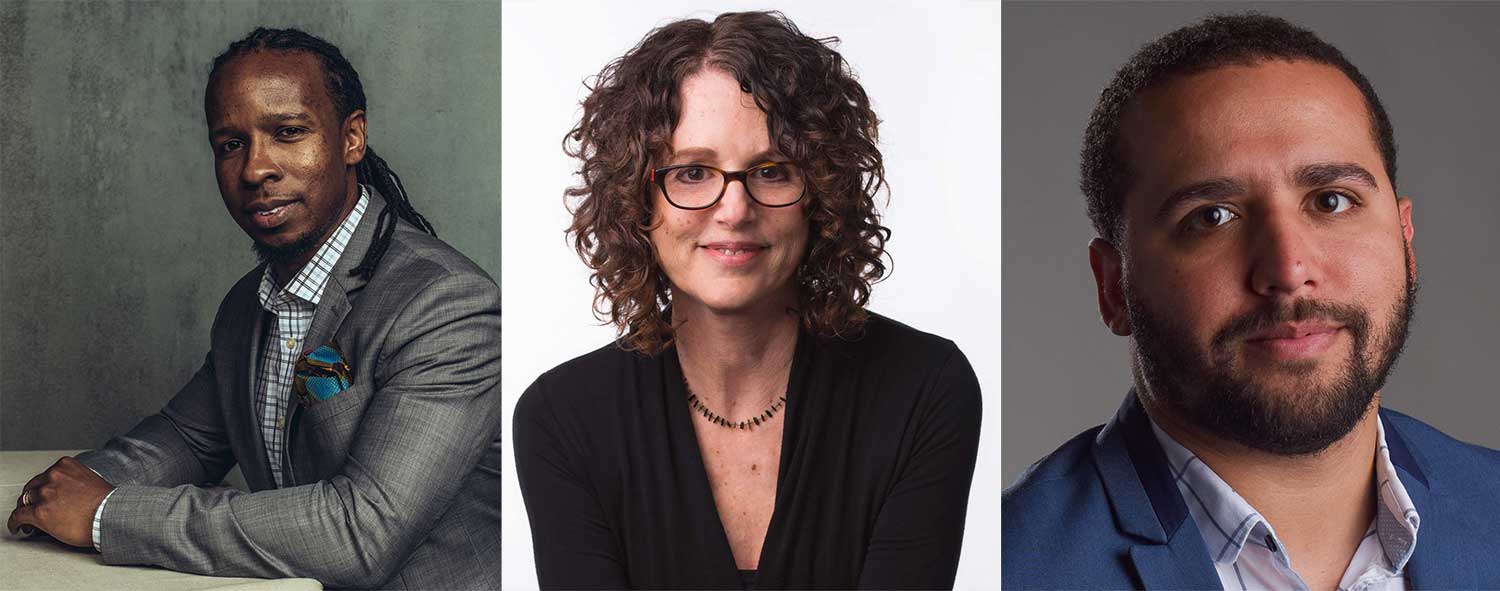By:
- Debra Bass
Published Date
By:
- Debra Bass
Share This:

Panelists Ibram X. Kendi, author of “How to Be an Anti-Racist,” Robin DiAngelo, who wrote “White Fragility: Why It’s So Hard for White People to Talk About Racism” and Wesley Lowery of CBS News, the Washington Post and Quibi.
Panel of Top Authors Promises Constructive Discussion on Racial Injustice
As the national conversation about systemic racism and its inhumane consequences continues, the National Conflict Resolution Center has coordinated “A Path Forward” in an effort to continue the discussion. The virtual event will take place at 7 p.m. on Aug. 20 featuring prominent national scholars addressing ways to effectively engage with this difficult topic.
Co-sponsored by UC San Diego Extension, the event will feature New York Times bestselling authors Ibram X. Kendi, author of “How to Be an Anti-Racist,” and Robin DiAngelo, who wrote “White Fragility: Why It’s So Hard for White People to Talk About Racism.” The top-ranked authors will be joined by Pulitzer Prize-winning journalist Wesley Lowery of CBS News, the Washington Post and Quibi.
The panelists have each spent years offering sober insights on why racial disparities exist and persist. Recent events have made it abundantly clear that racism isn’t going to resolve itself; Kendi has become a highly sought after speaker for his insightful explanations of what it means to be “anti-racist” versus what it means to be “not racist,” and why that distinction is so important. Meanwhile, DiAngelo has become known for her blunt discussions of racism's best friends: denial, complicity and inaction.
“One either allows racial inequities to persevere, as a racist, or confronts racial inequities, as an antiracist. There is no in-between safe space of ‘not racist.’ The claim of 'not racist' neutrality is a mask for racism,” Kendi explains in his book.
He refutes the idea that one can be silent on the issue of racism without being an active participant in its continuation. Kendi posits that the most insidious aspects of systemic racism are on auto-pilot. The tip of the iceberg that is racism is overt and aggressive, but what lies beneath the surface is more deadly, he said.
DiAngelo offers this frank explanation in her work: “I believe that White progressives cause the most daily damage to people of color. I define a White progressive as any white person who thinks he or she is not racist, or is less racist, or in the ‘choir,’ or already ‘gets it.’
“We will put our energy into making sure that others see us as having arrived,” wrote DiAngelo, who is white. “White progressives do indeed uphold and perpetuate racism, but our defensiveness and certitude make it virtually impossible to explain to us how we do so.”
And Kendi, who is black, has been just as vocal in discussing the issue of internalized racism in the Black community, and the dangerously false notion that there is something wrong with Black people that somehow justifies, explains or causes policies of systemic racism.
The upcoming discussion is expected to center on where do we go from here? The good news is that the panelists have all expressed confidence that systemic racism can be solved, but first, it must be faced.
A Path Forward is NCRC’s comprehensive response to the cultural changes caused by the pandemic and the social unrest brought about by the killing of George Floyd in Minneapolis, Ahmaud Arbery in Georgia, Breonna Taylor in Louisville and too many other names of Black people who have become internationally known as symbols of deep-seated and widespread inequity within the American justice system.
The webinar is part of an effort to deliver the training, skills, and facilitation necessary to emerge stronger through the current adversity. It is especially important as so many of us are self-isolating because of the coronavirus pandemic that we not become disconnected from the world at large or turn a blind eye to this troubling and pervasive issue that h is so much more than simple ignorance and hatred.
“When it comes to healing America of racism, we want to heal America without pain, but without pain, there is no progress,” Kendi explained.
Share This:
Stay in the Know
Keep up with all the latest from UC San Diego. Subscribe to the newsletter today.



